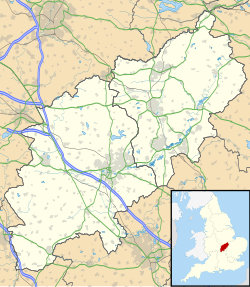This article needs additional citations for verification .(May 2025) |
| Thorpe Waterville | |
|---|---|
 Village sign | |
Location within Northamptonshire | |
| OS grid reference | TL0281 |
| Unitary authority | |
| Ceremonial county | |
| Region | |
| Country | England |
| Sovereign state | United Kingdom |
| Post town | Kettering |
| Postcode district | NN14 |
| Dialling code | 01832 |
| Police | Northamptonshire |
| Fire | Northamptonshire |
| Ambulance | East Midlands |
| UK Parliament | |
Thorpe Waterville is a village in the English county of Northamptonshire. It was first attested in 1199 as Torp(e), and Thorp Watervile in 1300. Ascelin de Waterville was a landowner in the area in the 12th century. [1] [2]
